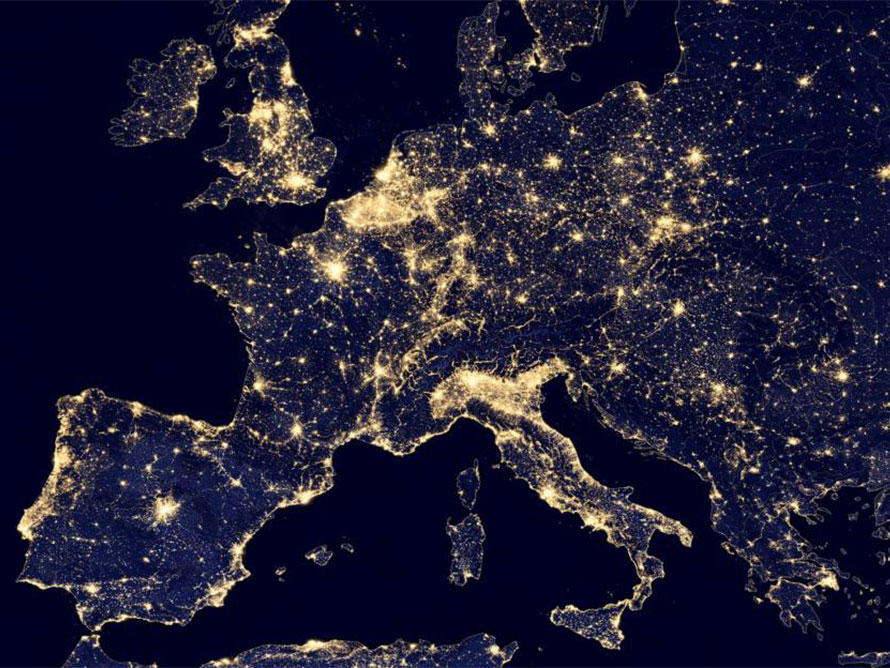Should we be less afraid of the dark? A new survey shows that light pollution is increasing, posing risks to us and our environment. Campaigners are trying to reverse that trend.
World ‘losing night’ due to light pollution
Should we be less afraid of the dark? A new survey shows that light pollution is increasing, posing risks to us and our environment. Campaigners are trying to reverse that trend.
When was the last time you saw the Milky Way? Unless you live in the countryside, your chances of glimpsing all the stars above are slim. And according to a new study, they are only going to get slimmer.
A US government satellite has been taking regular snapshots of Earth at night in order to track our use of artificial outdoor lights. The resulting images of the illuminated planet are beautiful, but the picture they paint of our society is less pretty. They reveal that our use of lights has increased by more than 2% every year since 2012.
Trends vary across the world. Light use in wealthy countries has stayed quite steady. In some developing nations, like India, it has skyrocketed. It has only decreased in a handful of places, like war-torn Syria and Yemen. Overall, the study's authors conclude that we are experiencing a "loss of night".
The invention of electric light in the 19th century changed the world. It created more time for work, travel, and socialising. But its overuse leads to problems, too. Light pollution has been found to mess with animals' habitatsFor example, pollution disrupts pollination by nocturnal insects and can send birds who migrate by night off course., the cycles of trees, and our own healthThe science here is complex, but excessive exposure to light is known to mess with our circadian rhythm (aka body clock). Such disruptions have been linked to a range of issues, from obesity to cancer.. It also blots out the stars.
This has triggered a backlash, known as the "dark-sky movement". Campaigners encourage governments to turn street lamps off late at night, introduce intelligent lighting systemsThese are lights that adapt their brightness to factors like the weather and the number of people about. Think of a football stadium that dims its lights after the game has finished and the crowds have left., and so on.
They organise events like National Dark-Sky Week, for which people turn out their lights at the full moon. "Astrotourists" flock to special areasThere are a number of certified Dark Sky Places in the UK, including Galloway Forest Park in Scotland, Exmoor National Park in England, and the Brecon Beacons National Park in Wales. that restrict light pollution in order to see stars.
However, these measures have caused anger in their turn. In urban areas, people often associate dark nights with crime. MPs have campaigned against light-cutting policies for this reason. While studies do not agree on whether they actually encourage crime, the fear that people feel is real enough.
Fear of the darkThere are various official terms for this, including nyctophobia, lygophobia and scotophobia. has deep evolutionary roots. Our ancestors were threatened by predators who roamed at night, so they learned to stay near light. As this study shows, that instinct has not left us.
Should we be less afraid of the dark?
Too right, say some. Artificial light is the most valuable invention of all time. By letting us see in the dark, it brings us fun, comfort, and practical benefits; it gives relief to our deepest anxieties. Imagine going back to our ancestors' way of life, when the sunset effectively ended the day. It would be miserable.
But think of what we have lost, reply others. The dark actually sharpens our other senses. Paradoxically, it makes us more aware of our surroundings. And it allows for stargazing, which connects us to the universe we belong to. Artificial light lets us see things, but the dark makes us truly perceive them.
Keywords
Animals' habitats - For example, pollution disrupts pollination by nocturnal insects and can send birds who migrate by night off course.
Our own health - The science here is complex, but excessive exposure to light is known to mess with our circadian rhythm (aka body clock). Such disruptions have been linked to a range of issues, from obesity to cancer.
Intelligent lighting systems - These are lights that adapt their brightness to factors like the weather and the number of people about. Think of a football stadium that dims its lights after the game has finished and the crowds have left.
Special areas - There are a number of certified Dark Sky Places in the UK, including Galloway Forest Park in Scotland, Exmoor National Park in England, and the Brecon Beacons National Park in Wales.
Fear of the dark - There are various official terms for this, including nyctophobia, lygophobia and scotophobia.
World ‘losing night’ due to light pollution

Glossary
Animals' habitats - For example, pollution disrupts pollination by nocturnal insects and can send birds who migrate by night off course.
Our own health - The science here is complex, but excessive exposure to light is known to mess with our circadian rhythm (aka body clock). Such disruptions have been linked to a range of issues, from obesity to cancer.
Intelligent lighting systems - These are lights that adapt their brightness to factors like the weather and the number of people about. Think of a football stadium that dims its lights after the game has finished and the crowds have left.
Special areas - There are a number of certified Dark Sky Places in the UK, including Galloway Forest Park in Scotland, Exmoor National Park in England, and the Brecon Beacons National Park in Wales.
Fear of the dark - There are various official terms for this, including nyctophobia, lygophobia and scotophobia.
